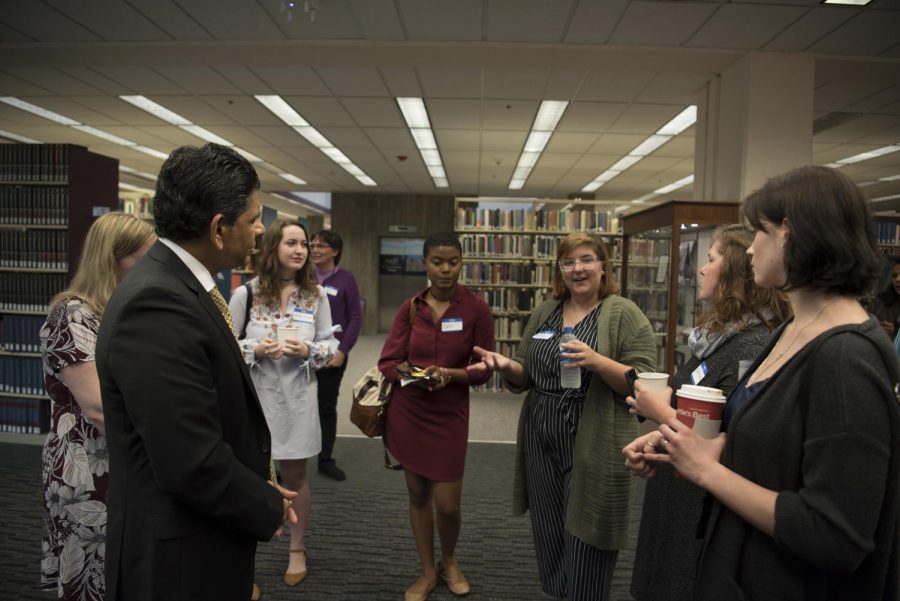Provided by the English Department
President Ashish Vaidya with members of the English department.
From the perspective of Dr. John Alberti
“So what can you do with an English major?” Reflecting on the past six weeks of teaching and learning under quarantine, this perennial question—one that makes English majors and teachers alike roll our eyes and sigh—has taken on a new relevance.
My usual answer is to, like a good English student, revise the question: “so you mean, what can you do with the ability to communicate effectively in a wide range of situations to a wide range of audiences, to imagine new possibilities and new ways of thinking, to empathize with multiple perspectives and ways of being, and to understand the power of stories to either divide us or unite us, scare us or inspire us?”
The response of our students and faculty to the Covid-19 crisis has shown me just how relevant and important these skills really are. For me as the chair of English, it’s reflected in the resilience, ingenuity, and humanity in how we have responded to the pandemic.
Some examples: we’ve all heard about the different kinds of challenges faced by teachers and students caused by the sudden switch to online learning, but what if you’re both a teacher and a student at the same time? That was the situation faced by four of our majors who were doing their student teaching at area high schools when the world turned upside down.
Student teaching is hard enough in “normal” times—teaching all day, every day, making lesson plans, being observed and evaluated. How did our majors respond when the switch to online learning came? I’ll let Dr. Jonathan Cullick, our secondary education specialist, tell the story:
“Working with their classroom teachers online, our NKU English student teachers continued to design unit plans, lessons, and activities. They met with classes and individual students on Zoom. They even continued to be observed by their supervising professor on Zoom. Most importantly, they were a source of comfort and reassurance to their own young students and the parents who were at home with them.”
See what I mean about those skills of creativity, communication, and empathy? Our creative writers didn’t miss a beat, either, moving their monthly open mike night onto Zoom, where our graduating seniors shared their work along with other students and even alums from miles away.
Likewise, our graduate Master of Arts students were suddenly faced with moving their capstone presentations, the culmination of two years of their hard work in our graduate program, from face-to-face to an online environment. The results astonished me with their polish, creativity, and effectiveness.
In a time of crisis, we all instinctively turn to the arts. In the middle of a quarantine, when the future seems even more uncertain than ever, we need the power of stories to connect us and to remind us, in the famous words from Shakespeare’s Hamlet, that “There are more things in heaven and earth, Horatio, Than are dreamt of in your philosophy” (for “Horatio,” substitute your own talking head or pundit).
And speaking of Shakespeare, a writer who died over four hundred years ago and lived in a world so different from ours, yet whose work continues to remain ever relevant, a final, gentle reminder of how stories bring us together, from one of our Shakespeare experts, Dr. Parmita Kapadia:
“A student in my Shakespeare class shared that she has been forwarding my prompts for the course Discussion Boards to her grandmother and the two of them write and share their responses with each other. She said they FaceTime, and that sharing the prompts has helped them both feel connected to one another.”
So I guess there are some things you can do with an English major!


